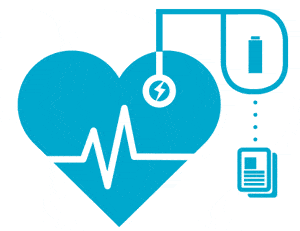What is a Pacemaker?

Most pacemakers comprise of two components. The first component is the pulse generator, which is responsible for generating the electrical pulses. The second is the pacing lead, which is a small wire running from the pulse generator to the heart. The lead carries the electrical signals from the pulse generator to regulate your heartbeat.
Types of Pacemakers
There are two types of pacemakers commercially available:
Single chamber pacemakers
One pacing lead is used to carry electrical pulses to the heart’s left or right atrium.
Dual-chamber pacemakers
Two pacing leads are used. One will be placed in the right atrium and the other in the left atrium.
While pacemakers are recommended for people with an irregular heartbeat, you may also need one if you:
- Have a congenital heart disease.
- Recently had a heart attack.
- Are taking certain heart medicines, such as beta-blockers.
If you fulfill any of the above conditions, make an appointment to consult a heart specialist / cardiologist to find out if you need a pacemaker.
Pacemaker Implantation Surgery
The pacemaker implantation operation is usually performed under local anaesthesia, and takes one hour to complete. The cardiologist makes a small incision in the chest and creates a pocket to house the pacemaker. With the help of x-ray imaging, pacing leads are threaded through a vein to your heart. The cardiologist will then close the incision with sutures.
After the operation, your cardiologist will program the pacemaker. Your cardiologist may order an x-ray to check the pacemaker’s position and assess if there are any potential complications.
Most people will be discharged 24 to 48 hours after the pacemaker implantation.
Maintaining Your Pacemaker
Most pacemakers will last between five to seven years. However, your cardiologist may schedule regular follow-ups with you, as your pacemaker may wear and tear over time. If your pacemaker contains information about your heart rhythm, your cardiologist may also retrieve the information to better understand your condition.
Implantable Cardioverter-Defibrillator: An Alternative to Pacemakers
Alternatively, your cardiologist may recommend an implantable cardioverter-defibrillator (ICD) if your irregular heartbeat is life-threatening and will increase your risk of sudden cardiac arrest. In addition to having the functions of a pacemaker, an ICD can deliver shocks to your heart if it detects that your heart rhythm is reaching dangerous levels.
Make An Appointment
Make an appointment to consult a heart specialist / cardiologist at Raffles Heart Centre. Select "Specialist Appointment". Under Specialist Appointment Details, select "Cardiology" or "Cardiothoracic Surgery".
Make an enquiry. We will get back to you within 2 working days. You can reach us at 6311 2260.